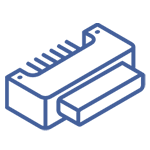Chinese Chip Equipment Makers Thrive Amid US Restrictions
As the United States tightens its grip on China's semiconductor industry, Chinese manufacturers of chip-making tools are reaping the benefits, with orders from the country's foundries surging in recent months. Domestic equipment manufacturers, including Naura and AMEC, are securing a higher proportion of tenders from Chinese foundries than in previous years, as chipmakers rush to replace foreign-made equipment with domestically made alternatives. According to a recent analysis by Huatai Securities, nearly half (47.25%) of all machinery equipment tenders by Chinese foundries from January to August 2023 were won by local manufacturers. This marks a significant turning point for the industry, reflecting an acceptance of the ongoing US restrictions on technology imports and an emphasis on self-reliance. The US Biden administration recently expanded measures aimed at China's chip industry, aiming to prevent Beijing from acquiring cutting-edge US technologies for its military. In response, China's foreign ministry lodged a stern rebuke, arguing that these restrictions violate the principles of the market economy and fair competition.
Despite these challenges, Chinese manufacturers are making significant strides in producing equipment in areas such as etching and cleansing, where they compete globally with American firms such as Applied Materials Inc and Lam Research Corp. Some AMEC machines have even entered production lines for chips as advanced as those using 5 nanometer technology.
However, there are still hurdles to overcome, particularly in the field of lithography, which requires extremely complex optics and process precision. China has not been able to procure the extreme ultraviolet (EUV) lithography machines needed to make the most advanced chips.
Despite these challenges, Chinese firms such as Huawei Technologies and SMIC have managed to produce an advanced chip for the Mate 60 Pro phone by modifying DUV machines they were still able to purchase from ASML. This progress, though significant, still leaves room for growth, as Chinese manufacturers continue to strive for self-sufficiency in the production of advanced semiconductor equipment.
 Power Semiconductor Procurement After the Nexperia Shake-Up—NXP for Stability, ON for Technology, or Nexperia for Value?UTMEL04 November 20253346
Power Semiconductor Procurement After the Nexperia Shake-Up—NXP for Stability, ON for Technology, or Nexperia for Value?UTMEL04 November 20253346The recent supply chain turmoil surrounding Netherlands-based Nexperia has sent shockwaves through the global semiconductor industry, forcing procurement professionals to re-evaluate their sourcing strategies.
Read More Arm's IPO: A New Chapter in Chip TechnologyUTMEL30 August 20232168
Arm's IPO: A New Chapter in Chip TechnologyUTMEL30 August 20232168On August 21st, Arm, a leading chipmaker, filed for an initial public offering (IPO) on America's Nasdaq, marking a significant milestone in the chip technology industry.
Read More The Future of Semiconductors: Chiplets and Super NoCsUTMEL30 August 20233418
The Future of Semiconductors: Chiplets and Super NoCsUTMEL30 August 20233418The world of semiconductor implementation technology is on the brink of a major transformation. The advent of chiplets, multiple silicon dice mounted on a common substrate, is gaining traction among big players, with proprietary in-house implementations already in use.
Read More Huawei's Mysterious Advanced Chip in New Mate 60 Pro Smartphone Sparks Speculation Amid US SanctionsUTMEL01 September 20233462
Huawei's Mysterious Advanced Chip in New Mate 60 Pro Smartphone Sparks Speculation Amid US SanctionsUTMEL01 September 20233462Huawei Technologies' silence concerning the advanced semiconductor that powers its latest flagship smartphone, the Mate 60 Pro, has sparked intense speculation in China. The company's silence has rais
Read More Volkswagen Overhauls Semiconductor Sourcing Strategy Amid Supply ChallengesUTMEL01 September 20234450
Volkswagen Overhauls Semiconductor Sourcing Strategy Amid Supply ChallengesUTMEL01 September 20234450Volkswagen Group has announced a significant revamp to its procurement strategy for semiconductors and electronic parts. The automaker is shifting towards direct purchasing from manufacturers, a move
Read More
Subscribe to Utmel !
![DGD2136S28-13]() DGD2136S28-13
DGD2136S28-13Diodes Incorporated
![TEN-HS5]() TEN-HS5
TEN-HS5Traco Power
![RT1206DRE072K61L]() RT1206DRE072K61L
RT1206DRE072K61LYageo
![CRCW1206374RFKEAHP]() CRCW1206374RFKEAHP
CRCW1206374RFKEAHPVishay Dale
![HEF4044BT,652]() HEF4044BT,652
HEF4044BT,652NXP USA Inc.
![T9GV5L14-22]() T9GV5L14-22
T9GV5L14-22TE Connectivity
![7-2837156-2]() 7-2837156-2
7-2837156-2TE Connectivity
![DT13-12PB-B016]() DT13-12PB-B016
DT13-12PB-B016TE Connectivity
![HPBA015C500R050E]() HPBA015C500R050E
HPBA015C500R050ETE Connectivity
![151117-5404]() 151117-5404
151117-5404Molex


 Product
Product Brand
Brand Articles
Articles Tools
Tools










